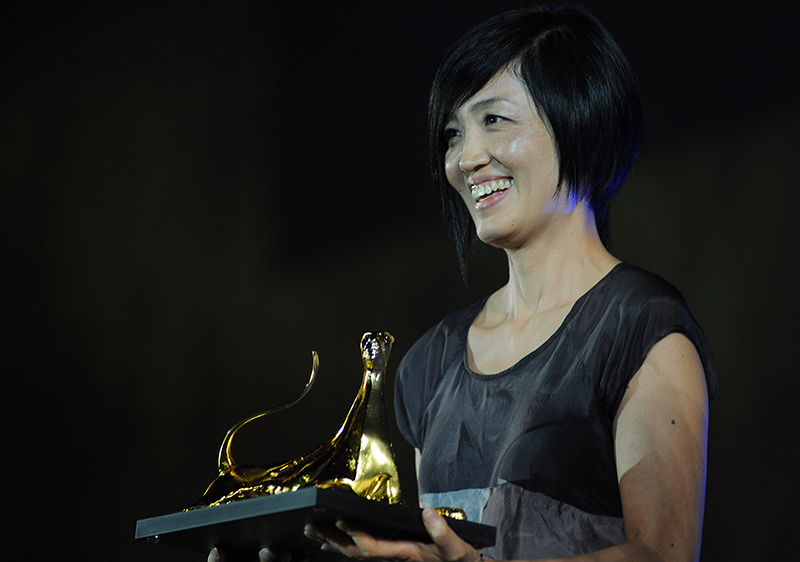North Korea is perhaps the most secretive, least-known country on earth. A totalitarian dictatorship, its cult of personality has elevated three generations of the Kim family, starting with Kim Il Sung (1912-1994), to the status of gods.
Soon-Mi Yoo, a professor of film and video at the Massachusetts College of Arts, grew up in South Korea. At REDCAT recently, she introduced the documentary she directed and edited, “Songs from the North.”
“As a child, North Korea was always in our consciousness. Threats, propaganda. We were so close yet North Korea was a world away.”
The film took four years to make. She visited North Korea three times, in 2010, 2011 and 2014.
Even so, the country remained “a mysterious place.” Like all visitors, she was closely monitored, accompanied at all times by minders, and taken to the same few sites to which foreigners are allowed access.
At first she was frustrated with her limited footage.
“They didn’t understand why I was taking a photo of a flower, a bucket.” Then she began to see what she had with new eyes: the posters, slogans, music, patriotic marches, romantic ballads (the romance inevitably being with “The Fatherland”), and the misty-eyed love songs (ditto).
She searched online for more footage. North Korea, she was surprised to discover, has its own YouTube channel. She unearthed shots of the launching of the Kwangmy≈èngs≈èng-3 (touted by North Korea as an Earth observation satellite, though widely believed to be a disguised ballistic missile test); propaganda-based children’s theater; and a soap opera clip of a husband bitterly accusing his wife of a lack of patriotism (“I didn’t think you were that kind of woman!”).
The film is punctuated by haunting text.
“This longing all my life for place I was not permitted to go until recently.
“How do you explain it? It was a land of evil yet sacred as your mother’s womb.
“Is North Korea the loneliest country on earth? A country without friends, without history. Only myths, repeated endlessly from morning till night.”
Yoo lets the camera rest wordlessly, wrenchingly, on the individual human face. The North Korean heart seems half child-like — sentimental, yearning — and half obsessed with vengeance.
“All North Korean narratives stem from this memory of colonial suffering and armed struggle for independence,” Yoo observes.
That’s not entirely paranoia. In a Cold War newsreel, Lt. Gen. Edward Timberlake nonchalantly bemoans our failure to deploy an A-bomb during the Korean War. A skinny old man, recalling U.S. atrocities, says, “I hope you understand our hated and rage toward high-level American decision makers.”
But it’s the worship of state — “The Great Leader is our mother and father!” a citizen exclaims of Kim Il Sung — that astonishes most. It’s as if the human longing for God had been tweaked so as to pathologically imprint upon an ordinary human being — a megalomaniac with a bad haircut and a Soviet-era suit warbling a tune he penned himself: “Nostalgia.”
In an extraordinary more recent scene, a boy named Kim Kum Sok publicly denounces his father who committed a “terrible crime against our country,” after which his mother promptly died of grief.
The Loving Marshal Kim Jong Un, however, does not blame the hurt child, the sick child. The marshal protects him, loves him, forgives him, has fulfilled his deepest wish to represent his class!
Onstage the boy shouts himself hoarse, flailing with gratitude. Tears run down the cheeks of his fellow students, his teachers and the seasoned military personnel in the audience.
There is no mention of the purges, the millions who died of famine, the brutally-enforced isolation from the rest of the world.
Those things hover silently in the background, and so does the question they raise: namely, how could such iron-handed repression inspire such blind devotion and unalloyed reverence?
To her great credit, Yoo does not purport to explain. Nor does she judge.
“From the beginning it was clear I didn’t understand. I thought it was some kind of disease. Love, they said.”
Love: the longing for home that transcends all suffering, all ideologies, all boundaries.
Shin Dong-hyuk (b. 1982), the only known person to have been born in a North Korean death camp and escaped, tells the story from the standpoint of the oppressed — and strangely, the story is almost the same.
Shin was born into a forced labor camp, saw a 6-year-old girl beaten to death for hiding a few kernels of corn, snitched out his own mother and brother, witnessed their executions and escaped through an electrified fence on which his friend died.
And here again is this “disease,” this love.
For after living in “freedom” for a time in South Korea, one of Shin’s major emotions was homesickness.
When asked what he missed of his former life, he responded:
“I miss the innocence and the lack of concerns I had. In the camp where I lived I had a pure heart. I did not have to think about anything. I didn’t have to think about the power of money like I do in South Korea. Though I don’t miss everything from that camp, I miss the purity of my heart.
“I don’t know how else to say it. I miss my innocent heart.”
Heather King is a blogger, speaker and the author of several books.

